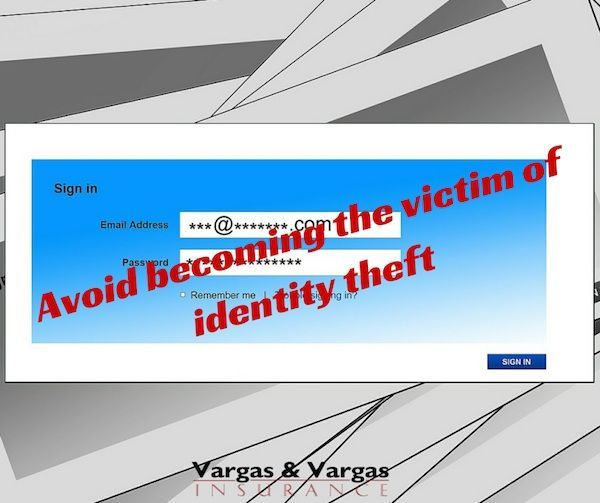4 Ways How to Protect Against Identity Theft | Blog | Vargas & Vargas Insurance

In today’s world, everything is connected, and almost everything is stored in ‘the cloud’ – including your personal information. It only takes one data breach for your sensitive information to get into the wrong hands. This can include banking information, your Social Security Number, and much more.
In light of all the recent data breaches, we want to share some tips on how you can keep your personal information protected, and avoid becoming the victim of identity theft :
Watch your existing accounts.
As soon as you learn about a data breach that happened at a company with which you do business, you need to ensure that you regularly check your related accounts. Make it a point to check the accounts for suspicious activity on a regular basis, and notify the appropriate parties if you see any unusual transactions.
We should note that this is a step that everyone should take, and it is not specific to those people are at high risk of credit fraud or identity theft. Everyone with access to accounts online should check for erroneous transactions on a regular basis.
Sign up for credit alerts and fraud protection.
If a company that you have an account with is the victim of a breach, you will likely be offered some kind of credit monitoring or identity theft protection for free, or at a reduced price. You should consider this offer! In fact, anyone with information in the cloud should have some sort of credit monitoring service. They’re often available for a very reasonable price, often less than $10 a month.
In addition, a fraud alert system will make it more difficult for someone else to create a credit account in your name. This alert will ensure that any lender or credit issuer opening a credit account in your name contacts you directly. This makes it much less likely that it be done without your knowledge. It will add one simple step to the process when you look to create a new account, but make it virtually impossible for criminals to commit credit fraud against you.
File your taxes early.
Did you know that thieves need only minimal amounts of information in order to file a fraudulent tax return in your name? If a thief is able to steal your identity and claim your tax refund, you will probably spend quite a while sorting out the resulting mess with the IRS. Save yourself the trouble by filing your taxes as early as possible, before any shady characters can.
Remain vigilant.
When you’re the victim of identity theft, or your personal information is compromised, it’s easy to monitor your information for a while. After a bit, though, you could lull into a state of complacency. Some thieves will wait before using the information that they stole in order to take advantage of this fact. This is why it’s important to remain vigilant in the monitoring and protecting of your personal information.
With all of the above tips, you can help to ensure that your personal information is protected against theft. If you would like to make sure that your physical possessions are also protected, call 617-298-0655 to speak with a Vargas and Vargas Insurance agent about getting a quality home insurance or auto insurance policy from the Massachusetts insurance experts.


